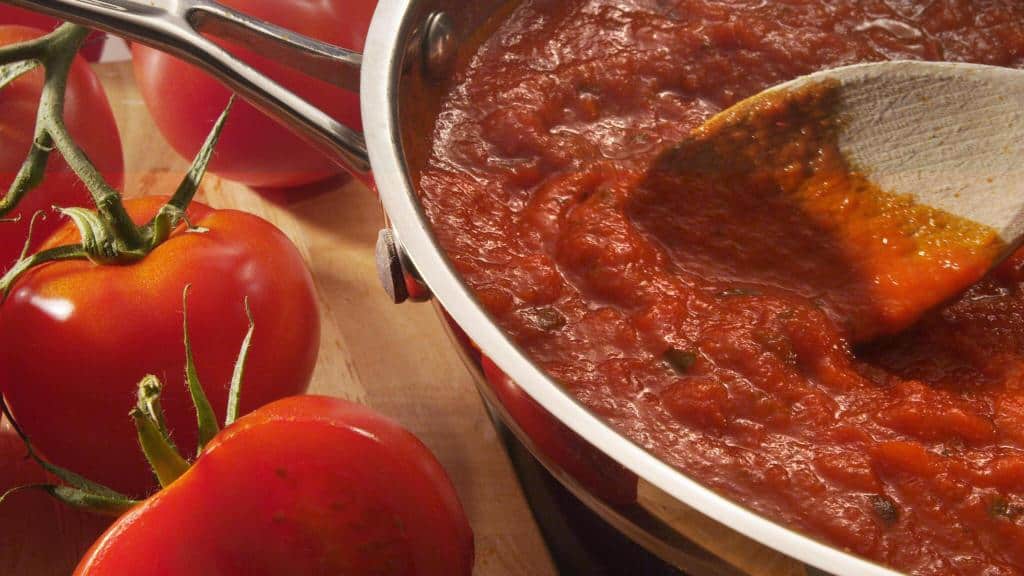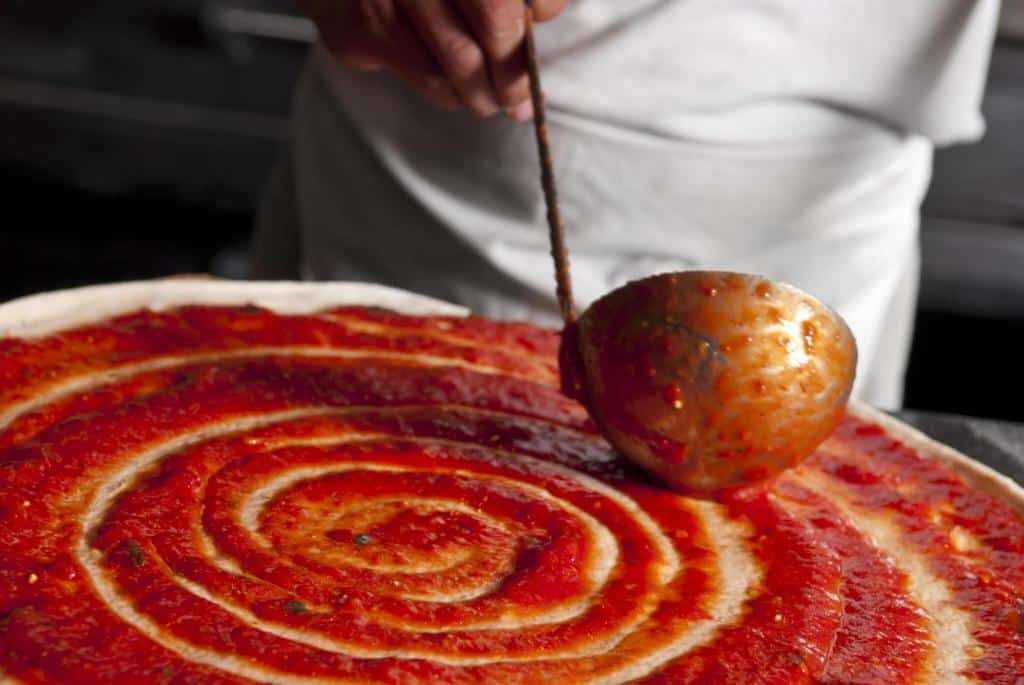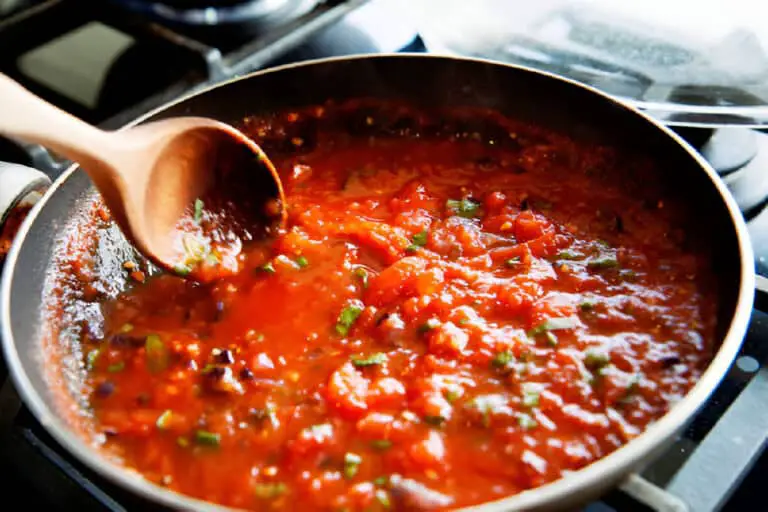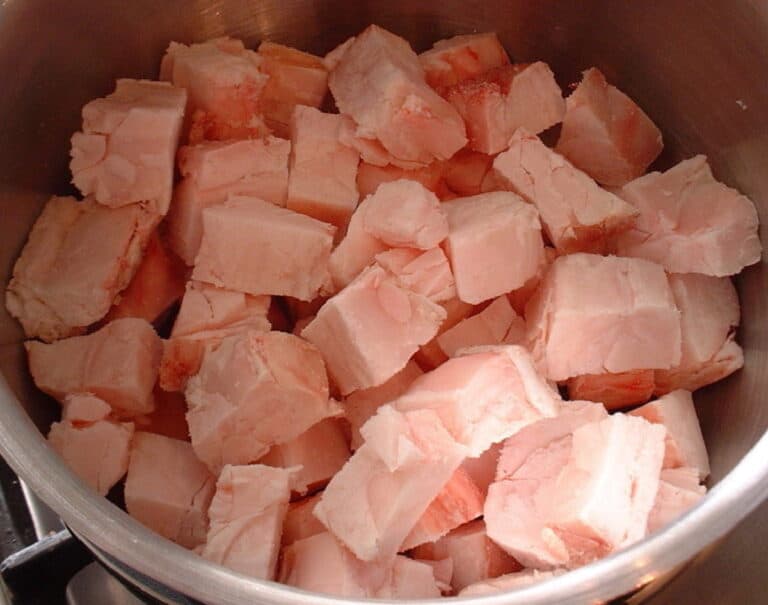How to Reduce Acidity in Marinara Sauce: Saucy Solutions

If you’re a fan of marinara sauce but find its acidity overpowering, fear not! We’ve got just the tips and tricks to help you achieve a perfectly balanced and less acidic marinara sauce.
Nothing ruins a good plate of pasta quite like an overly tangy sauce that leaves your taste buds in revolt. So, why does marinara sauce tend to be so acidic? Well, it all comes down to two main culprits: tomatoes and wine.
Tomatoes are naturally high in acid, which gives them that classic bite we associate with marinara. Also, many traditional recipes include wine. This adds to the overall acidity.
But fear not—reducing acidity doesn’t mean sacrificing flavor or quality! With a few simple adjustments, you can turn your very sour mix into a smooth delight.
So, if you’re ready to make your homemade marinara sauce less tangy while keeping its rich flavors, keep reading for our top tips on how to make less acidic marinara sauce. It will have everyone clamoring for seconds!
Why Do You Need to Reduce Acidity in Marinara Sauce?
Reducing acidity in marinara sauce is essential for creating a well-balanced and palatable dish. Firstly, high acidity can overpower the natural sweetness of tomatoes, leading to a sharp and tangy flavor that may be unpleasant for some.
Secondly, excessive acidity can cause heartburn and indigestion for those with sensitive stomachs. By lowering the acidity, you make the sauce more stomach-friendly without compromising its rich taste.
Thirdly, reducing acidity enhances the overall versatility of the sauce. A less acidic marinara can complement a wider variety of dishes, from pasta to pizza. You are free to experiment with various culinary creations thanks to this adaptability. Experiment with the ingredients. Find the perfect balance for a tasty marinara sauce that works well in many dishes.
| Benefits of Reducing Acidity in Marinara Sauce |
| 1. Enhances flavor balance |
| 2. Improves stomach-friendliness |
| 3. Expands sauce versatility |
| 4. Allows for culinary experimentation |
Understanding Acidic Tomato Sauce: Unveiling the Culprit

Before diving into the solutions, let’s understand why some marinara sauces lean towards the acidic side. Tomatoes, the stars of this classic sauce, naturally contain citric acid. While this acidity contributes to the brightness of the flavor, it can sometimes be a bit too much.
Table 1: Acidic Levels in Common Tomato Varieties
| Tomato Variety | pH Level |
| Roma | 4.5-5.4 |
| San Marzano | 4.1-4.8 |
| Cherry | 3.3-4.0 |
Knowing your tomatoes’ acidity levels helps tailor your approach to reducing acidity in your marinara sauce.
How to Reduce Acidity in Marinara Sauce
Making the perfect marinara sauce is more than just combining ingredients. It’s about balancing flavors. One crucial element to consider is acidity. High acidity can impart an overwhelming tanginess that may not suit everyone’s palate. In this guide, we’ll explore practical ways to reduce acidity and enhance the overall appeal of your marinara sauce.
Balancing Flavors through Ingredient Substitution
One way to reduce the acidity of marinara sauce is by swapping ingredients. The new ones add sweetness and balance the flavors. One option is to use low-acid tomatoes or tomato varieties known for their sweeter taste.
Chefs frequently favor San Marzano tomatoes, for instance, due to their naturally low acidity and rich flavor profile. Alternatively, you can choose ripe plum or cherry tomatoes, known for their inherent sweetness.
Another creative approach adds sweetness to marinara sauce. It involves exploring alternative ingredients, not just tomatoes. Consider adding roasted red peppers or carrots to the mix.
Roasted red peppers lend a slight tang. They also bring a sweet that complements the other flavors in the sauce. Carrots, on the other hand, provide an added touch of natural sweetness and also help thicken the texture of your marinara sauce. Those are known herbal remedies for the acidic taste of any food.
Regulating pH Levels with Alkaline Ingredients
One effective way to reduce the acidity of marinara sauce is by using alkaline ingredients to help neutralize its acidic properties. Using these ingredients in your recipe, you can achieve a milder and more balanced flavor profile.
One popular option is adding a small amount of baking soda to your marinara sauce. Baking soda acts as an alkaline compound that can effectively counteract the acidity present in tomatoes. However, it’s important to use caution when using baking soda, as too much can result in an unpleasant taste and texture.
Start by adding a pinch of baking soda at a time. Do this while simmering your sauce. Then, taste after each addition until you reach the desired level of acidity.
Another great way to regulate pH levels is by finely grating vegetables, such as onions or celery, into your marinara sauce. These vegetables are naturally alkaline and not only add depth of flavor but also work to balance out the acid from the tomatoes. Consider sautéing them before adding them to your sauce for added sweetness and complexity.
Incorporating Dairy Products
One effective way to reduce the acidity of marinara sauce is by incorporating dairy products into the recipe. Adding cream cheese or milk-based sauces can help reduce acidity. They do this by balancing the tartness of tomatoes. They also add a rich quality to your sauce.
Consider adding a dollop of cream cheese or a splash of heavy cream to your marinara sauce for a velvety smooth texture and milder flavor. The creamy element helps balance out the tanginess of tomatoes, resulting in a more well-rounded and less acidic taste.
Alternatively, you can opt for milk-based sauces such as béchamel or Alfredo sauce as a base for your marinara. Adding fatty dairy products such as butter, heavy cream, or crumbled cheese can also help reduce acidity.
These rich and indulgent options not only soften the acidity but also add depth and complexity to your dish. Just add these sauces to your homemade creamy tomato sauce. Adjust the amounts to get the desired creaminess.
Enhancing Flavor with Herbs
One of the simplest ways to balance out the acidity in marinara sauce is by adding herbs that complement its flavors. Basil, in particular, works wonders at reducing acidity while also imparting a fresh and aromatic taste to your sauce. Adding a handful of fresh basil leaves near the end of cooking can give your marinara a lovely herbaceous flavor that balances out the sour notes.
Also, try using other herbs, like oregano or thyme. They will improve your sauce’s flavor. These herbs not only contribute their distinct tastes but also provide additional balancing properties for a more well-rounded marinara flavor.
Try Sugar Substitutes
As for sweeteners, use natural ones instead of sugar to mellow out the acidity. They do so without adding too much sweetness. Honey is an excellent choice, as it adds depth and complexity while mellowing out any sharp tang from tomatoes.
You may try to add vanilla extract as a natural sweetener. Another option worth trying is agave syrup. It offers a mild sweetness. This sweetness complements the marinara sauce very well.
Adding small amounts of sugar, honey, or grated carrots can balance out the tanginess. They provide mild sweetness to counteract acidity and make the taste more pleasant.
Olive Oil Elegance: Introducing a Silky Smooth Finish
Olive oil not only adds richness but also helps mellow out acidity. Consider finishing your marinara with a drizzle of high-quality extra-virgin olive oil. It not only enhances the texture but also contributes to a more nuanced taste.
Olive Oil to Reduce Acidity in Marinara Sauce
Introducing olive oil into your marinara sauce not only reduces acidity but also infuses a rich, velvety texture. This versatile ingredient brings a multitude of benefits to your culinary creations.
1. Neutralizing Acidity: Olive oil acts as a natural balancer, smoothing out the sharp edges of acidity. Its smooth consistency helps in creating a more well-rounded and palatable sauce.
2. Enhancing Flavor: Beyond acidity reduction, olive oil adds its own distinct flavor profile. The fruity and earthy notes contribute depth and complexity, elevating the overall taste of the marinara.
3. Texture Improvement:Olive oil makes the skin feel luxurious. It turns basic marinara into a velvety, indulgent experience. It enhances the sauce’s consistency, making it cling to pasta or pizza crusts more effectively.
4. Nutritional Boost: Apart from its culinary benefits, olive oil brings a healthful touch. Packed with monounsaturated fats and antioxidants, it adds nutritional value to your sauce.
Incorporating olive oil is a simple yet effective way to transform your marinara sauce, reducing acidity while enhancing flavor and texture. The table below highlights the key advantages of using olive oil in your sauce.
Cooking Methods to Reduce Acidity
Cooking techniques are crucial. They reduce the acid in marinara sauce while keeping its rich flavor.
Overcooking is another factor that intensifies the acidity of marinara sauce. When cooked for too long at high temperatures, tomatoes break down further and release more acids into the mix.
One effective technique is to opt for shorter cooking times and simmering instead of boiling the sauce. Balance is key here. You must bring out flavors without overdoing the acidity. This needs careful attention to cooking times and techniques.
Boiling makes things more acidic by concentrating flavors. Simmering at a lower temperature lets the ingredients meld without raising acidity. Simmering techniques are proven effective for less tartness of any acidic foods.
Another key aspect is tasting and adjusting the seasoning. You must do this continuously throughout cooking. This helps in achieving a well-balanced flavor profile and ensures that any excess acidity is counteracted with other complementary flavors like sweetness or umami.
Other Methods That Help to Reduce Acidity in Sauce
To reduce acidity in tomato sauce, there are several tomato varieties that can be used, but it is more important to use good-quality tomatoes. The less acidic the tomatoes are, the less acidic the sauce will taste.
You must use ripe, quality tomatoes for marinara sauce. They are sweeter and less acidic than unripe ones. Choosing tomato varieties specifically labeled as low-acid or sweet can also make a notable difference in reducing overall acidity levels within your marinara sauce.
Sugar can also be added to balance the acidity, but it should be added gradually to avoid making the sauce too sweet.
Infusing a burst of freshness and achieving the perfect acidic balance in your marinara sauce can be effortlessly achieved with the addition of lemon juice. This versatile citrus ingredient not only elevates the flavor profile but also brings a delightful zing to every bite
Worcestershire sauce, fish sauce, or liquid aminos can be added to give the sauce a savory flavor. However, it is important to note that all tomatoes are acidic, so the pH of tomato sauce will always stay under 7.
| Also see: How Do You Keep Sauce From Separating When Reheating? |
Trial and Error: Discovering Your Perfect Balance
When it comes to reducing the acidity in marinara sauce, experimentation is key. Everyone’s taste buds are unique, and what may be too acidic for one person could be perfectly balanced for another. That’s why it’s crucial to embrace the process of trial and error when seeking your perfect flavor profile.
Start by taking small steps towards your goal. For instance, try adding a pinch of sugar or a teaspoon of honey to counterbalance the acidity. Taste after each addition to gauge how it affects the overall flavor. Some may find that just a touch of sweetness is enough to mellow out the tanginess, while others might prefer a more pronounced difference.
Also, don’t limit yourself to sweeteners. Many ingredients can add complexity and balance without overpowering other flavors. Consider experimenting with carrots or caramelized onions as natural sweeteners. They are a subtle way to reduce acidity without hiding marinara’s classic flavors.
Testing the Techniques: A Tangy Transformation
To put these techniques to the test, let’s consider a classic marinara recipe and explore how each saucy solution plays a role.
Classic Marinara Recipe:
- Tomatoes (San Marzano) – 2 lbs, crushed
- Garlic – 4 cloves, minced
- Olive oil – 2 tbsp
- Salt and pepper – to taste
- Fresh basil – a handful, chopped
Experimentation Results:
| Saucy Solution | Effect on Acidity | Taste Profile |
| Baking Soda | Reduced | Neutral with a slight sweetness |
| Sugar | Balanced | Sweet and savory |
| Olive Oil | Mellowed | Rich and nuanced |
| Dairy (Parmesan) | Softened | Creamy with a subtle tang |
Final Thoughts on Achieving Perfectly Balanced Marinara Sauce
In this article, we’ve explored ways to reduce marinara sauce’s acidity. This creates a perfectly balanced flavor. Let’s recap some of the key tips covered:
1. Use sweeter tomatoes: Choose kinds like Roma or San Marzano. They tend to be sweeter and have less acid. This will provide a solid foundation for your marinara sauce.
2. Balance with sweetness: To counteract the tanginess of the tomatoes, add a touch of sweetness to your sauce. You can accomplish this by incorporating ingredients such as grated carrots, finely diced onions, or even a sprinkle of sugar.
3. Cook longer at low heat: Simmering your marinara sauce for a while over low heat mellows its flavors and softens any initial acidity.
4. Add dairy products: A bit of cream or butter can reduce acidity. They also add richness and smoothness to your marinara sauce.
5. Finish with herbs and spices: Add fresh herbs like basil, oregano, or thyme near the end of cooking. This adds complexity to your sauce’s flavor and tempers the acidity.
With these strategies in mind, you can make homemade marinara sauces. They will be less acidic but bursting with flavor. By applying these techniques and trying different combinations, you’ll enjoy a harmonious marriage of sweet and savory flavors. It will surely elevate your pasta dishes.






